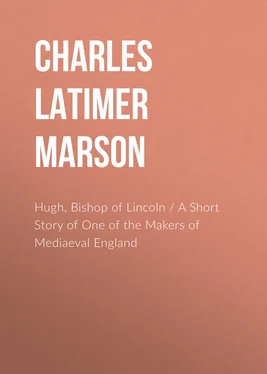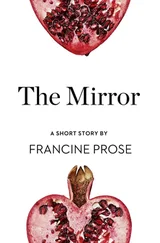Charles Latimer Marson - Hugh, Bishop of Lincoln / A Short Story of One of the Makers of Mediaeval England
Здесь есть возможность читать онлайн «Charles Latimer Marson - Hugh, Bishop of Lincoln / A Short Story of One of the Makers of Mediaeval England» — ознакомительный отрывок электронной книги совершенно бесплатно, а после прочтения отрывка купить полную версию. В некоторых случаях можно слушать аудио, скачать через торрент в формате fb2 и присутствует краткое содержание. Жанр: foreign_prose, foreign_antique, на английском языке. Описание произведения, (предисловие) а так же отзывы посетителей доступны на портале библиотеки ЛибКат.
- Название:Hugh, Bishop of Lincoln / A Short Story of One of the Makers of Mediaeval England
- Автор:
- Жанр:
- Год:неизвестен
- ISBN:нет данных
- Рейтинг книги:3 / 5. Голосов: 1
-
Избранное:Добавить в избранное
- Отзывы:
-
Ваша оценка:
- 60
- 1
- 2
- 3
- 4
- 5
Hugh, Bishop of Lincoln / A Short Story of One of the Makers of Mediaeval England: краткое содержание, описание и аннотация
Предлагаем к чтению аннотацию, описание, краткое содержание или предисловие (зависит от того, что написал сам автор книги «Hugh, Bishop of Lincoln / A Short Story of One of the Makers of Mediaeval England»). Если вы не нашли необходимую информацию о книге — напишите в комментариях, мы постараемся отыскать её.
Hugh, Bishop of Lincoln / A Short Story of One of the Makers of Mediaeval England — читать онлайн ознакомительный отрывок
Ниже представлен текст книги, разбитый по страницам. Система сохранения места последней прочитанной страницы, позволяет с удобством читать онлайн бесплатно книгу «Hugh, Bishop of Lincoln / A Short Story of One of the Makers of Mediaeval England», без необходимости каждый раз заново искать на чём Вы остановились. Поставьте закладку, и сможете в любой момент перейти на страницу, на которой закончили чтение.
Интервал:
Закладка:
The first attempt was little more than a sketch. 5,497 acres were marked off for the new house, in a wet corner of Selwood forest. But the land was not transferred from William FitzJohn and the villeins were not evicted or otherwise disposed of. The place was worse than a desert, for it contained possessors not dispossessed. The poor monks, few and unprepared, who came over at their own expense, probably expecting a roof and a welcome, found their mud flat was inhabited by indignant Somersetæ, whose ways, manners, language, and food were unknown to them. The welcome still customarily given in these parts to strangers was warmer than usual. The foreign English, even if their lands were not pegged out for Charterhouses, were persuaded that the brethren were landsharks of the most omnivorous type. The poor prior quailed, despaired, and hastily bolted, leaving an old and an angry monkish comrade to face the situation with a small company of lay brothers. Another prior arrived, and to the vexation of the king shuffled off his maltreated coil in a very short time. After spending Christmas (1179-80) in Nottingham, the king crossed into Normandy with young Henry before Easter, meaning to avenge the wrongs Philip Augustus did to his relatives. Here most probably it was that a noble of the region of Maurienne (come no doubt upon business of the impending war), chatted with him about the Charterhouse. He paid a warm tribute to Hugh in words of this kind, “My lord king, there is only one sure way of getting free from these straits. There is in the Charterhouse a certain monk, of high birth but far higher moral vigour. His name is Hugh of Avalon. He carries on him all the grace of the virtues; but besides, every one who knows him takes to him and likes him, so that all who see him find their hearts fairly caught. Those who are privileged to hear him talk are delighted to find his speech divinely or angelically inspired. If the new plantation of this most holy order in your lands should deserve to have this man to dress and rule it, you will see it go joyfully forward straight away towards fruiting in every grace. Moreover, as I am certain, the whole English Church will be very greatly beautified by the radiance of his most pure religion and most religious purity. But his people will not easily let him go from their house, and he will never go to live elsewhere unless it be under compulsion and against his will, so your legation must be strong and strenuous: you must struggle to compass the matter even with urgent prayers until you get this man and him only. Then for the future your mind will be released from the anxieties of this care, and this lofty religion will make a noble growth to your excellency’s renown. You will discover in this one man, with the whole circle of the other virtues, whatever mortal yet has shown of longsuffering, sweetness, magnanimity, and meekness. No one will dislike him for a neighbour or house-mate; no one will avoid him as a foreigner. No one will hold him other than a fellow politically, socially, and by blood, for he regards the whole race of men as part and parcel of himself, and he takes all men and comforts them in the arms and lap of his unique charity.” The king was delighted with this sketch, and sent off post haste Reginald, Bishop of Bath (in whose diocese Witham lay), and an influential embassage to secure the treasure, if it could be done.
But the man who was being sought had just about then been finding the burden of this flesh so extremely heavy that he was more inclined to run riot in the things that do not belong to our peace than to settle comfortably upon a saint’s pedestal or to take up a new and disagreeably dull work. The fatal temptations of forty, being usually unexpected, are apt to upset the innocent more surely than are the storms of youth; and poor Hugh was now so badly tried that the long life of discipline must have seemed fruitless. He just escaped, as he told his too-little reticent biographer, from one nearly fatal bout by crying out, “By Thy passion, cross, and life-giving death, deliver me.” But neither frequent confession, nor floggings, nor orisons, seemed to bring the clean and quiet heart. He was much comforted by a vision of his old prior Basil, who had some days before migrated to God. This dear old friend and father stood by him radiant in face and robe, and said with a gentle voice, “Dearest son, how is it with thee? Why this face down on the ground? Rise, and please tell thy friend the exact matter.” Hugh answered, “Good father, and my most kind nurser, the law of sin and death in my members troubles me even to the death, and except I have thy wonted help, thy lad will even die.” “Yes, I will help thee.” The visitor took a razor in his hand and cut out an internal inflamed tumour, flung it far away, blessed his patient, and disappeared, leaving no trace of his surgery in heart or flesh. Hugh told this story in his last illness to Adam, his chaplain, and added that though after this the flesh troubled him, its assaults were easy to scorn and to repress, though always obliging him to walk humbly.
The king’s messengers took with them the Bishop of Grenoble and unfolded their errand. The Charterhouse was horrified, and the prior most of all. He delayed a reply. The first prior refused the request. The votes varied. Bovo, a monk who afterwards succeeded to Witham, declared strongly that it was a divine call, that the holiness of the order might be advertised to the ends of the earth. Hugh was too large a light to keep under their bushel. He seems better fitted to be a bishop than a monk, he said. Hugh was then bidden to speak. He told them that with all the holy advice and examples about him he had never managed to keep his own soul for one day, so how could any wise person think him fit to rule other folk? Could he set up a new house, if he could not even keep the rules of the old one? This is childishness and waste of time. “Let us for the future leave such matters alone, and since the business is hard and urgent do you only occupy yourselves to see that this king’s undertaking be frittered no longer away half done, to the peril of souls and the dishonour of the holy order, and so from among you or from your other houses choose a man fit for this work and send him with these men. Since these are wise, do you too answer them wisely. Grant their desire, not their request. Give them a man not such as they seek under a mistake, but such as they devoutly and discreetly demand. It is not right that men should be heard unadvisedly who mistake the man of their request and who do not really want to be mistaken in the man’s qualifications. So, in a word, do not grant their request, but cheer them by bettering it.” The prior and Hugh were of one decision. The former declared point blank that he would not say go, and finally he turned to the Carthusian Bishop of Grenoble, “our bishop, father, and brother in one,” and bade him decide. The bishop accepted the responsibility, reminded them of the grief which arose when St. Benedict sent forth St. Maur to Western Gaul, and exhorted Hugh that the Son of God had left the deepest recess of His Deity to be manifest for the salvation of many. “You too must pilgrimage for a little time from your dearest, breaking for a while the silence of the quiet you have loved.” After much interruption from Hugh, the sentence was given. They all kissed him and sent him away forthwith. The king received him with much graciousness and ordered him to be carried honourably to Witham, and the wretched remnant in the mud flat received him as an angel of God. Well they might do so, for they seemed to have passed a melancholy winter in twig huts, now called “weeps,” in a little paled enclosure, not only without the requisites of their order, but with barely bread to their teeth. There was no monastery, not even a plan of one. William FitzJohn and his clayey serfs scowled upon the shivering interlopers, uncertain what injustice might be done to them and to their fathers’ homes, in sacrifices to the ghost of St. Thomas.
Читать дальшеИнтервал:
Закладка:
Похожие книги на «Hugh, Bishop of Lincoln / A Short Story of One of the Makers of Mediaeval England»
Представляем Вашему вниманию похожие книги на «Hugh, Bishop of Lincoln / A Short Story of One of the Makers of Mediaeval England» списком для выбора. Мы отобрали схожую по названию и смыслу литературу в надежде предоставить читателям больше вариантов отыскать новые, интересные, ещё непрочитанные произведения.
Обсуждение, отзывы о книге «Hugh, Bishop of Lincoln / A Short Story of One of the Makers of Mediaeval England» и просто собственные мнения читателей. Оставьте ваши комментарии, напишите, что Вы думаете о произведении, его смысле или главных героях. Укажите что конкретно понравилось, а что нет, и почему Вы так считаете.












